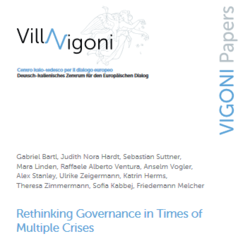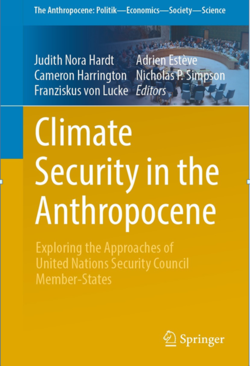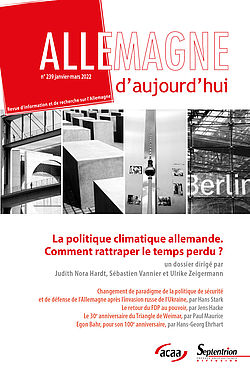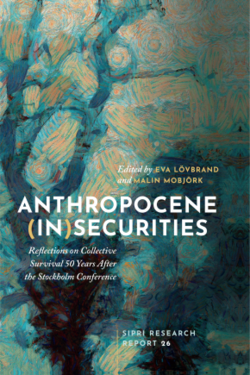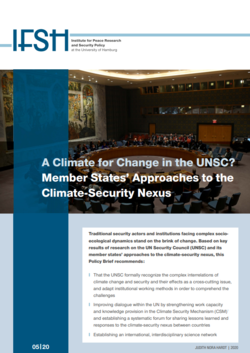Dr. Judith Nora Hardt | Forscherin
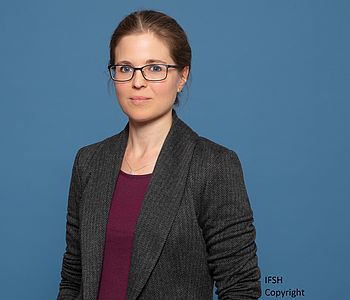
Mutterinstitut
:
Centre Marc Bloch
|
Position
:
Forscherin und Projektleiterin
|
Fachbereich
:
Politikwissenschaft
|
Biographie
Dr. phil. (PhD) Internationale Beziehungen
DEA (entspricht M.A.) Internationale Beziehungen, Internationales Recht und Rechtsgeschichte
B. Sc. Internationales Waldökosystem-Management
Bio
Judith Nora Hardt arbeitet als Postdoktorandin am deutsch-französischen Forschungszentrum für Sozialwissenschaften Centre Marc Bloch. Im Jahr 2014 promovierte Judith in den Internationalen Beziehungen an der Universität des Baskenlandes (Spanien). Sie arbeitete als Dozentin für Internationale Beziehungen, Naturschutz und Sozioökonomie an Hochschule für Nachhaltige Entwicklung Eberswalde (Deutschland) und ist seit 2017 Teil der Forschungsgruppe "Klimawandel und Sicherheit" an der Universität Hamburg. Außerdem ist sie assoziierte Wissenschaftlerin am Institut für Friedensforschung und Sicherheitspolitik (IFSH, Hamburg). Seit März 2021 ist sie Projektleiterin des dreijährigen deutsch-französischen Projekts „Multiple Crises: Covid-19 and the Entanglements of Public Health, Security and Ecology in Europe“, gefördert durch das Bundesministerium für Bildung und Forschung. Sie ist aktiv im Netzwerk von Wissenschaftlern für die Zukunft.
Zu ihren Büchern und begutachteten Veröffentlichungen gehören: Hardt, Judith Nora: Environmental Security in the Anthropocene. Assessing Theory and Practice (London: Routledge, 2018); "Encounters between Security and the Earth System Sciences: Planetary Boundaries and Hothouse Earth", in Chandler, David, Rothe, Delf und Müller, Franziska (Hrsg.): International Relations in the Anthropocene: New Actors, new Agencies and new approaches (London: Palgrave, 2021); "The United Nations Security Council at the Forefront of (Climate) Change? Verwirrung, Pattsituation, Unwissenheit", in: Politik und Regieren, 9,4: 5-15. Open Access (2021); unter:
Forschungsthema
Research Fields & Expertise
International Relations and Political Theory; Security Studies; Peace & Conflict Studies; Global Governance; Climate Politics and Climate Security
Research Projects
Judith's research is based on a critical-normative approach and aims to develop the conceptualizations of security, conflict, human well-being and justice via the new readings of human-nature relations. The forms and roles of agency, expertise, power and normative foundations within global governance are further constitutive elements of her research. The emerging Anthropocene Studies and the question of the changing critical theories in this context are also part of her research.
With association to the Institute for Peace Research and Security Policy of the University of Hamburg (IFSH), she led the project “Climate change in security perceptions, conceptions and practice at the United Nations Security Council” (2019-2020), which was funded by the German Federal Foreign Office. One of the central aims of her research is to overcome the several challenges of the climate security field and to thereby advance the development of the climate security agenda with the joined forces of the triangulation of theory and practice, developing new policy approaches and recommendations.
Since March 1st 2021, she has been the project manager of the Franco-German project (BMBF) Multiple Crises. Covid-19 and the Entanglements of Public Health, Security and Ecology in Europe. This three-year project, which is funded by the Federal Ministry of Education and Research, examines the entanglement and interaction of different crisis phenomena that are particularly evident as a result of the COVID-19 pandemic. Using the three major subject areas of public health, safety and ecology, concrete interdependencies between these phenomena, which are perceived as “existential crises”, are identified and analyzed.
One of the central aims of her research is to advance the development of the climate security agenda with the joined forces of the triangulation of theory and practice, developing new policy approaches and recommendations. She is active in the Network of Scientists For Future.
Titel der Dissertation
Environmental Security in the Anthropocene
Institution der Dissertation
Betreuer
(BMBF) Multiple Crises. Covid-19 and the Entanglements of Public Health, Security and Ecology in Europe
Veranstaltungen:
* 12.04.2024 – Abschlusskonferenz im Museum für Naturkunde Berlin
* 20.03.2024 – Multiple Crises Doktorand*innenkolloquium
* 16.10.2023-18.10.2023 – Workshop: Rethinking Governance in Times of Multiple Crises
* 29.06.2023 – Workshop: Climate Change & Security: From Multiple Practice(s) to Reconceptualising Paradigm(s)
* 20.06.2023 – Climate Change & Security : Practices, Confrontations and Futures
* 12.05.2023– Workshop: Resilienz im interdisziplinären Dialog
* 30.03.2023 – Multiple Crises Doktorand*innenkolloquium (zweites Treffen)
* 14.10.2022 – Multiple Crises Doktorand*innenkolloquium (erstes Treffen)
* 13.10.2022 – Podiumsdiskussion bei "Junges Forum 2022: Social Imaginaries in times of crisis"
Podcasts:
* 28.11.2023 – CMB-Podcast - Climate Security - Which discourses and practises around the world ? (with J.Hardt, D.Jayaram and C.Oliviera)
* 10.10.2022 – BR50-Podcast: Aktivismus in der Wissenschaft – Geht das? (P. Eiden-Offe, N. Fischer, J. Hardt und E. Heyne)
Publikationen:
Herausgaben:
Bartl, G.; Röcke, A.; Ries, S.; Tulmets, E. (2023) „Resilienz im interdisziplinären Dialog“ im "Forum" der Zeitschrift für Umweltpolitik und Umweltrecht (ZfU) 4/2023, pp. 507-592
Hardt, J. N.; Harrington, C.; Von Lucke, F.; Estève, A. and N. P. Simpson (eds.) (2023) Climate Security in the Anthropocene. Exploring the Approaches of United Nations Security Council Member-States, Cham: Springer Nature Switzerland
Hardt, J. N.; Zeigermann; Ulrike; Vannier, Sébastien (eds.) (2022) ”German Climate Policy” (original title: La politique climatique allemande), in Revue L’Allemagne D’Aujourd’hui, (internal review of the 13 articles), pp. 79-246
Hardt, J. N.; Zeigermann, U.; Vannier S. (under contract) Herausforderungen und Wege der deutschen Klimapolitik in Zeiten multipler Krisen, Campus Verlag.
Buchkapitel und Zeitschriftenartikel:
Bartl G., Hardt, J. N., Suttner, S., Linden, M., Ventura, A., Vogler, A., Stanley, A., Zeigermann, U., Herms, K., Zimmermann, T., Kabbej, S., Melcher, F. (2024) Rethinking Governance in Times of Multiple Crises. Vigoni Papers. 5/2023.
Bartl, G. (2024) Social and ethical implications of digital crisis technologies: Case study of pandemic simulation models during COVID-19. Special Issue "The Present and Future of Pandemic Technologies", edited by Dennis Krämer, Joschka Haltaufderheide, Jochen Vollmann (2023). In: Journal of Medical Internet Research (JMIR)
Bartl, G. (im Erscheinen) Resilienz als Transformationsnarrativ: Ausprägungen, Herausforderungen und Potenziale. In: Birgit Blättel-Mink, Torsten Noack, Corinna Onnen, Michael Opielka, Katrin Späte, Rita Stein-Redent (eds.). Vielfältige (widersprüchliche) Transformationen in krisenhaften Zeiten“. Schriftenreihe „Sozialwissenschaften und Berufspraxis“, Springer VS
Bartl, G.; Röcke, A.; Ries, S.; Tulmets, E. (2023) Resilienz im interdisziplinären Dialog, "Forum" der Zeitschrift für Umweltpolitik und Umweltrecht (ZfU), 4/2023
Bartl, G. (2023) Vielfalt und Offenheit statt Eindeutigkeit und Kontrolle. Konturen eines erweiterten Wissensbegriffes im Kontext sozial-ökologischer Nachhaltigkeit. In: Yvonne Siegmund, Ina Jessen und Ulrich Bildstein (eds.). Angst, Ekel, Scheitern. Ein Austausch zu den blinden Flecken der Nachhaltigkeit, Urbanophil Verlag, pp. 76-79
Bartl, G. (2023) Governance between ignorance and evidence. TA in the context of pandemic crisis management. In: Zeitschrift für Technikfolgenabschätzung in Theorie und Praxis (TATuP - Journal for Technology Assessment in Theory and Practice). TATuP Special topic in issue 2, 2023 “Potentials of TA in sudden and enduring crises”, pp. 30-35
Bartl, G. (2023) Krise und technologischer Solutionismus: Die politische Dimension des digitalisierten Umgangs mit Unsicherheit. In: A. Wagener / C. Stark (eds.): Die Digitalisierung des Politischen. Theoretische und praktische Herausforderungen für die Demokratie. Wiesbaden: Springer Verlag (Reihe "Sozialwissenschaften und Berufspraxis"), pp. 45-62
Bartl, G.; Hardt, J. (2022) Zum Verhältnis zwischen Wissenschaft und Politik im Kontext multipler Krisen: Covid-19 und die Klimakrise als Herausforderungen für die wissenschaftliche Politikberatung. In: Zeitschrift für Umweltpolitik & Umweltrecht 2/2022, pp. 155-178
Bartl, G. (2022) La relation science-politique face aux crises : l’exemple de la pandémie de Covid-19 en Allemagne. In: Allemagne d'aujourd'hui, n° 239/janvier-mars 2022 La politique climatique allemande. Comment rattraper le temps perdu ?, pp. 236-246
Hardt, J. N. (erscheint in 2024) “Climate Security and the European Union: Concept, Challenges, and Recommendations”, in Canadien Journal of Military Studies
Hardt, J. N. and Von Lucke, F. (erscheint in 2024) “Climate Security and Justice” in Zeigermann, U. and Böcher, M. (eds.) Handbook „Environmental Policy“, Edward Elgar
Hardt, J. N. (2024) “Ecological/climate change security” in Brechin, S. (eds.) Routledge Handbook of Climate Change and Society, Routledge
Hardt, J. N. (erscheint in 2024) “Climate change and the UN security council” in Mathews, R. and LeHolland, A. (eds.) Climate Change and International Relations, Edward Elgar
Hardt, J. N. (2023) “Climate Change and Security in the Anthropocene: Existential Threats, Ethics, and Futures” in Di Paola, Marcello and Pellegrino,Gianfranco (eds.) Springer Handbook of Philosophy of Climate Change, Springer Cham, pp. 1-19
Hardt, J. N.; Harrington, C.; Von Lucke, F.; Estève, A.; N. Simpson (2023) “Introduction: A Framework for Assessing Climate Security” in Hardt et al. (eds.) Climate Security in the Anthropocene. Exploring the Approaches of United Nations Security Council Member-States, Cham: Springer Nature Switzerland, pp. 10-28
Hardt, J. N.; Harrington, C.; Von Lucke, F.; Estève, A.; N. Simpson (2023) “Climate Security at a Crossroads: The Evolution and Future of Climate Security in the United Nations Security Council and its Member States“ in Hardt et al. (eds.) Climate Security in the Anthropocene. Exploring the Approaches of United Nations Security Council Member-States, Cham: Springer Nature Switzerland, pp. 306-326
Hardt, J. N.; Pérez de Armino, K. (2023) “Climate Security and the European Union” in Trombetta, J. M. (eds.) Handbook on Climate Security, Edward Elgar, pp. 127-143
Hardt, J. N.; Zeigermann, U.; Vannier, S. (2022) “German climate policy challenged to make up for lost time” (original title: La politique climatique allemande au défi de rattraper le temps perdu) in Revue L’Allemagne D’Aujourd’hui, 239, pp. 79-82
Hardt, J. N. (2021) “Research Perspectives and Boundaries of Thought: Security, Peace, Conflict, and the Anthropocene”, in Special Issue Revista de Estudios en Seguridad Internacional, Vol. 7/1, pp. 11-28
Hardt, J. N. (2021) “The United Nations Security Council at the edge of Climate Change?” in Journal Politics and Governance, Vol.9/4, pp. 5-15
Von Lucke, F.; J. N. (2022) “German climate policy from a foreign and security policy perspective: a solution for the future?” (original title: La politique climatique allemande sous l’angle de la politique extérieure et de sécurité: une solution d’avenir?) in Hardt, J. N.; Zeigermann, U. and Vannier, S. “La politique climatique allemande”, Revue L’Allemagne D’Aujourd’hui, 239, pp. 111-123
Hardt, J. N. Co-author of Diskussionsbeiträge der Scientists for Future: Brendel et al. (2023)„The energy transition as a response to climate crisis and war: Recommendations for resilience building and peacekeeping in Europe“ (orginal title: Die Energiewende als Antwort auf Klimakrise und Krieg:Empfehlungen zur Resilienzstärkung und Friedenssicherung in Europa” , 14, doi:10.5281/zenodo.7657957
Vorträge:
Bartl, G. (2023) Multiple Crises - Covid19 and the Entanglements of Public Health, Security and Ecology in Europe. Poster und Lightning Talk. Herrenhausen Conference “Climate Related Systemic Risks: Lessons Learned from Covid-19”, co-organized by the Max-Planck- Institute for Biogeochemistry, Jena and the Volkswagen Foundation. 21. - 23. Juni 2023, Hannover, Germany
Bartl, G. (2023) Ökologische Nachhaltigkeit zwischen Evidenz und Kontroverse. Vortrag auf dem Symposium "Angst, Ekel, Scheitern". Oberhafen, Hamburg, 25. - 27. Mai 2023. https://angstekelscheitern.de/dr-gabriel-bartl-oekologische-nachhaltigkeit-zwischen-evidenz-und-kontroverse/
Bartl, G. (2023) Between knowledge and ignorance: Implications of digital technologies for Public Health management. STS-hub.de Conference "Circulations" - Towards encounters amongst STS scholars in Germany , 15.-17. März 2023, RWTH Aachen
Bartl, G. (2022) Das Forschungsprojekt „ Multiple Crises. Covid-19 and the Entanglements of Public Health, Security and Ecology in Europe“. Poster auf dem Kongress der Deutschen Gesellschaft für Soziologie, Bielefeld, 26.- 30. September 2022. https://kongress2022.soziologie.de/fileadmin/kongress/Postersession/BartlDGSKongress22.pdf
Bartl, G. (2022) The acceptability of mathematical modeling in the context of Covid-19. Vortrag auf der International Online Conference “Digital technologies in the Covid-19 pandemic”. A Transnational Dialogue between Germany and Japan, 14.-18. März 2022
Bartl, G. (2021) Krise zwischen Nichtwissen und technologischem Solutionismus. Vortrag im Rahmen des Seminars "Krisen und kultureller Wandel" an der Hafen City University Hamburg, 27. Oktober 2021
Hardt, J. N. (2023) organization of the Panel together with Franziskus von Lucke “From Discourse to Practice? Exploring the Institutionalization of Climate Security in the Anthropocene"; presentation “Climate Security in the Anthropocene: Exploring the Approaches of United Nations Security Council Member-States”; Discussant of the panel “Planetary Climate Governance: Making the climate governable and reconfiguring political technologies in the Anthropocene” at the European International Studies Association Conference, Potsdam, Germany, 5.-9 September 2023
Hardt, J. N. (2023) Presentation of the paper “The UN Security Council: At the Forefront of Climate Change?" for Panel "Climate Change and Security: Institutional Responses” at the International Studies Association Conference, Montreal, Canada, 15-18. March 2023
Hardt, J. N. (2023) Paper presentation “Contrasting Climate Security Approaches of the European Union with Climate and Earth System Sciences”, Climate and Security Workshop, University of Durham, Durham, UK, 19.-20. January 2023
Hardt, J. N. (2022) Input presentation at the „Kick-off event for the dialogue process: The Federal Government's foreign climate policy strategy“, Deutsche Gesellschaft für Auswärtige Politik, Berlin, Germany, 15. October 2022
Hardt, J. N. (2022) Paper presentation together with Adrien Estève “Climate Security at the Extremes: Comparing French and Indian Approaches in the United Nations Security Council“ at the workshop “Climate Security. Toward a critical conceptualization", Hamburg, Germany, 28.-30. November 2022
Hardt, J. N. (2021) Paper presentation “Climate Crisis: What is at stake for Security? (original title: Crise climatique : quels enjeux pour la sécurité?), Colloque du Centre FrancoPaix, Montreal, Canada, 2.-3-December 2021 (online)
Hardt, J. N. (2021) Paper at the international conference “From a Climate‐Security Nexus of Conflicts to a Nexus of Synergies. Climate change action for peacebuilding and human security”, Research Group Climate and Security (CLISEC), Hamburg, Germany, 2.-3. December 2021
Hardt, J. N. (2021) Part of the podium „Transnational scientific work in the context of climate protection“, BMBF-Project „Wissen Entgrenzen“, Max Weber Stiftung, CMB, Berlin, Germany, 15. September 2021
Hardt, J. N. (2021) Discussant at the panel “Anthropocene Securities: Recollections and Reflections 50 Years After the Stockholm Conference on the Human Environment”; Paper presentation “The United Nations Security Council at the brink of (socioecological) Change” at the Panel, Climate Change and Security beyond the state, International Studies Association Conference (ISA), Las Vegas, USA (online), 6.-9- April 2021
Hardt, J. N. (2021) Discussant at the session “Epistemology of Scarcity: Resources, Environment and Conflict”, Association pour les Études sur la Guerre et la Stratégie (Associacion pour les Études sur la Guerre et la Stratégie), (online), 18. May 2021
Rethinking Governance in Times of Multiple Crises
10.Juli 2024Ulrike Zeigermann , Friedemann Melcher , Gabriel Bartl , Katrin Herms , Judith Nora Hardt , Sebastian Suttner, Mara Linden, Raffaele Alberto Ventura, Anselm Vogler, Alex Stanley, Theresa Zimmermann, Sofia Kabbej
https://shs.hal.science/halshs-04643847v1
The publication stems from a workshop that sought to critically rethink governance in times of multiple crises by assessing the crisis responses of political decision- makers, scientific experts and society at large in the context of climate change and pandemics. The workshop was funded by the German Ministry for Education and Research (BMBF) and the Franco-German Research Center for Social Sciences and Humanities Centre Marc Bloch (CMB) and it was organized in cooperation with Sciences Po, Paris. It brought together scholars from different academic traditions in an interdisciplinary and interactive work environment to exchange theoretical, conceptual and methodological approaches to researching multiple crises.
Climate Security in the Anthropocene
21.Mai 2023Judith Nora Hardt , Cameron Harrington, Franziskus von Lucke, Adrien Estève, Nicholas P. Simpson
Collection: The Anthropocene: Politik—Economics—Society—Science
ISBN: 978-3-031-26016-2
This chapter introduces the book, Climate Security in the Anthropocene—Exploring the Approaches of United Nations Security Council Member-States. Climate change is increasingly positioned as a security issue. A number of influential governance actors including states, international organisations, and civil society groups now connect climate change to a variety of security threats such as armed conflict, disasters, low socio-economic development, and fragile governing institutions. These threat perceptions have translated into political action and have led to the formation of a complex constellation of governance actors in response. In particular, over the past fifteen years both permanent and non-permanent member-states of the United Nations Security Council (UNSC) have been instrumental in constructing and responding to climate security threats. This introductory chapter presents the overall aim of the book, which is to analyse whether the concept of security has shifted over time with respect to climate change, and if so, how these shifts have occurred in state practices. It begins by tracing the evolution of climate security in academic scholarship and in the UNSC. It then presents the theoretical framework of the book, which distinguishes between three ideal-types of climate security: national security, human security, and ecological security. It concludes by outlining the methodology of the book, which is comprised of fifteen case study chapters that explore the various ways in which member-states that sat on the UNSC between 2018 and in 2020 constructed and responded to climate security threats.
La politique climatique allemande. Comment rattraper le temps perdu ?
29.April 2022Judith Nora Hardt , Sébastien Vannier , Ulrike Zeigermann
Allemagne d'aujourd'hui
Edition: Presses Universitaires Septentrion
Collection: Allemagne d'aujourd'hui
ISBN: 2757436139
Réunissant chercheurs allemands et français, articles scientifiques et interviews d'acteurs centraux de la politique climatique allemande, ce numéro offre une vue interdisciplinaire sur les différents enjeux de la question du climat en Allemagne. Un vaste panorama qui permet de mieux comprendre l’histoire, les enjeux, les acteurs mais aussi les contradictions du débat climatique chez nos voisins.
Zum Verhältnis zwischen Wissenschaft und Politik im Kontext multipler Krisen: Covid-19 und die Klimakrise als Herausforderungen für die wissenschaftliche Politikberatung
04.April 2022Judith Nora Hardt , Gabriel Bartl
Climate Change and Security within the United Nations: Insights from the UN Environment Programme and the UN Security Council
17.September 2021Judith Nora Hardt , Edited by Eva Lövbrand and Malin Mobjörk
SIPRI Research Reports
Edition: SIPRI, Oxford University Press.
Collection: SIPRI Research Reports
ISBN: 9780198787303
In this essay, the volume editors present the key themes of their new book Anthropocene (In)securities: Reflections on Collective Survival 50 Years After the Stockholm Conference, published by SIPRI and Oxford University Press.
Statement by Scientists 4 Future (S4F) regarding the "Demands of Fridays for Future Germany to the German Representatives in the EU
01.Oktober 2020Judith Nora Hardt , Baumann et al.
Berlin, 02.10.2020 | Die Scientists for Future (S4F) belegen, dass die Forderungen der Fridays for Future (FFF) an die EU-Politik sachlich erforderlich und wissenschaftlich begründet sind. Nach Berechnungen des IPCC ergibt sich ein Restbudget für Emissionen der EU27 von 20 Gt CO2 ab 2021, um die Erderwärmung auf maximal 1,5 Grad zu begrenzen. Eine Reduktion der Emissionen von 80 % bis 2030 entspricht einem Pfad in diesem Budgetrahmen. Die EU müsste spätestens im Jahre 2035 CO2-neutral sein. Die Forderungen von FFF sind mit dem 1,5-Grad-Ziel konsistent. Sie sind klimawissenschaftlich begründet und liegen politisch wie ökonomisch im Bereich des Notwendigen und Machbaren.
A Climate for Change in the UNSC? Member States’ Approaches to the Climate-Security Nexus. Policy Brief 05|20
22.Juni 2020Judith Nora Hardt
Deutsch
Neuer IFSH Policy Brief: A Climate for Change in the UNSC? Member States’ Approaches to the Climate-Security Nexus
22.06.2020
Inwieweit nehmen die 15 derzeitigen Mitgliedstaaten des UN-Sicherheitsrates den Klimawandel als Bedrohung für ihre eigene und die internationale Sicherheit war? Inwiefern integrieren sie den Klimawandel-Sicherheits-Nexus, also die vielfältigen Sicherheitsbedrohungen, die vom Klimawandel ausgehen, in ihre Innen- und Außenpolitik sowie in ihre Position, die sie in den Vereinten Nationen vertreten? Im neuen IFSH Research Report stellen Dr. Judith Nora Hardt und Alina Viehoff bedeutende Forschungsergebnisse zu diesen Fragen vor. Die Analyse wurde mit Unterstützung eines großen internationalen und interdisziplinären Wissenschaftsnetzwerkes in dem Zeitraum von Dezember 2019 bis April 2020 erarbeitet und legt den Fokus auf traditionelle Sicherheitsakteure, aber auch auf andere staatliche Akteure und schließt ein breites Sicherheitsverständnis ein.
Der vorliegende Forschungsbericht von Dr. Judith Nora Hardt und Alina Viehoff ist der erste, der sich systematisch mit oben genannten Fragen auseinandersetzt. Dabei legt er einen besonderen Schwerpunkt auf die Beziehungen zwischen nationaler und internationaler Sicherheit, indem der Bericht die nationalen Politiken der 15 Mitgliedstaaten des UN-Sicherheitsrat – dem einzigen internationalen Organ mit einem Mandat zur Aufrechterhaltung des Weltfriedens und der internationalen Sicherheit – ins Zentrum der Aufmerksamkeit rückt. Die Studie enthält die detaillierten Forschungsergebnisse, die bereits als Grundlage für den IFSH Policy Brief #5 „A Climate for Change in the UNSC? Member States’ Approaches to the Climate-Security Nexus“ dienten, der kurz zuvor erschienen ist.
Die beiden Autorinnen sehen es als essentiell an, dass der Sicherheitsrat die wechselseitigen Beziehungen von Klimawandel und Sicherheit und die unterschiedlichen Auswirkungen, die sich aus diesen Zusammenhang ergeben, anerkennt. Dabei wird die Notwendigkeit eines institutionellen Wandels des Sicherheitsrates hervorgehoben, der insbesondere durch den Einbezug von wissenschaftlicher Expertise fundiert und multilateral gestützt sein sollte. Zudem empfehlen sie, die traditionelle Sicherheitspolitik, die sich zumeist auf Sicherheit im engeren und traditionellen Sinne bezieht, um sozio-ökologische Aspekte, wie z.B. extreme Wettereignisse und existentielle Bedrohungen für Inselstaaten und zukünftige Generationen, zu erweitern.
Der Research Report entstand im Rahmen des Projektes „The role of climate change in security conceptions and perceptions of the UNSC member states“, das durch das Auswärtige Amt gefördert wurde. Das Projekt war eine Kooperation zwischen dem Institut für Friedensforschung und Sicherheitspolitik an der Universität Hamburg (IFSH) und der Forschungsgruppe Klimawandel und
Englisch
New IFSH Policy Brief: A Climate for Change in the UNSC? Member States’ Approaches to the Climate-Security Nexus
22.06.2020
Dr. Judith Nora Hardt
Traditional security actors and institutions facing complex socio-ecological dynamics stand on the brink of change. How do the 15 current UN Security Council member states approach the connections between climate change and security? In the new IFSH Policy Brief, Dr. Judith Nora Hardt presents the research results of the project "Climate Change and Security in the UN Security Council" [v2] (CLSEC UNSC) on this question. The results illustrate how essential it is for the Security Council to recognize the interrelations of climate and security and their multiple effects. The policy brief emphasizes the urgent need for institutional, multilateral and scientifically-informed change to ensure international peace and security.
The detailed research results will be published in the upcoming IFSH Research Report #5 "A Climate for Change in the UNSC? Member States' Approaches to the Climate-Security Nexus"
[v1]Link zur Homepage: https://ifsh.de/forschung/klimaforschung/klimawandel-und-sicherheit-im-un-sicherheitsrat
[v2]Link zur Homepage: https://ifsh.de/en/research/climate-research/climate-change-and-security-in-the-un-security-council
